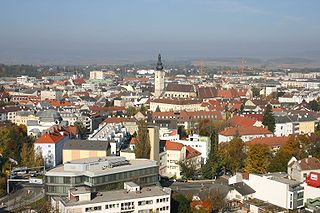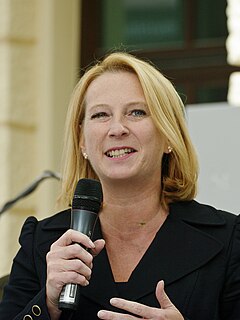| Michael Ludwig | |
|---|---|
 | |
| Mayor and Governor of Vienna | |
| Assumed office 24 May 2018 | |
| Deputy | Maria Vassilakou |
| Preceded by | Michael Häupl |
| Chairman of the SPÖ Vienna | |
| Assumed office 27 January 2018 | |
| Federal Chairman | Christian Kern |
| Preceded by | Michael Häupl |
| Second Vice-Mayor and deputy Governor of Vienna | |
| In office March 2009 –October 2010 | |
| Governor | Michael Häupl |
| Councilor for Wohnen, Wohnbau and Stadterneuerung of Vienna | |
| Assumed office January 2007 | |
| Governor | Michael Häupl |
| Personal details | |
| Born | 3 April 1961 Vienna |
| Political party | Social Democratic Party |
Michael Ludwig (born 3 April 1961) is an Austrian politician (SPÖ) and since May 2018 the mayor [1] and governor [2] of Vienna. Since January 2018 he also serves as the chairman of the SPÖ Vienna. [3]

Austria, officially the Republic of Austria, is a country in Central Europe comprising 9 federated states. Its capital, largest city and one of nine states is Vienna. Austria has an area of 83,879 km2 (32,386 sq mi), a population of nearly 9 million people and a nominal GDP of $477 billion. It is bordered by the Czech Republic and Germany to the north, Hungary and Slovakia to the east, Slovenia and Italy to the south, and Switzerland and Liechtenstein to the west. The terrain is highly mountainous, lying within the Alps; only 32% of the country is below 500 m (1,640 ft), and its highest point is 3,798 m (12,461 ft). The majority of the population speaks local Bavarian dialects as their native language, and German in its standard form is the country's official language. Other regional languages are Hungarian, Burgenland Croatian, and Slovene.
A politician is a person active in party politics, or a person holding or seeking office in government. Politicians propose, support and create laws or policies that govern the land and, by extension, its people. Broadly speaking, a "politician" can be anyone who seeks to achieve political power in any bureaucratic institution.

Vienna is the federal capital and largest city of Austria, and one of the nine states of Austria. Vienna is Austria's primate city, with a population of about 1.9 million, and its cultural, economic, and political centre. It is the 7th-largest city by population within city limits in the European Union. Until the beginning of the 20th century, it was the largest German-speaking city in the world, and before the splitting of the Austro-Hungarian Empire in World War I, the city had 2 million inhabitants. Today, it has the second largest number of German speakers after Berlin. Vienna is host to many major international organizations, including the United Nations and OPEC. The city is located in the eastern part of Austria and is close to the borders of the Czech Republic, Slovakia, and Hungary. These regions work together in a European Centrope border region. Along with nearby Bratislava, Vienna forms a metropolitan region with 3 million inhabitants. In 2001, the city centre was designated a UNESCO World Heritage Site. In July 2017 it was moved to the list of World Heritage in Danger.
Ludwig is as a councilor of Vienna since January 2007 and was second vice-mayor and deputy governor of Vienna from March 2009 to October 2010.















